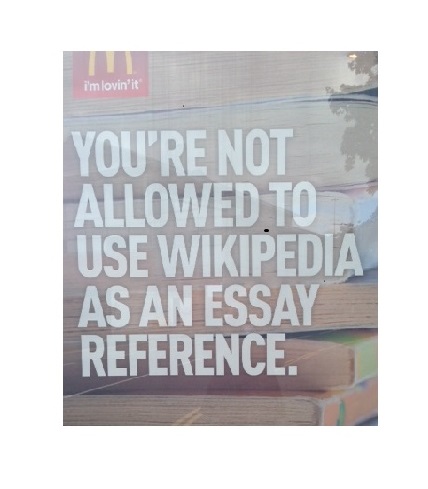Outside my university I was met with an advert for a fast food chain which was clearly focused on the student population. The advert boldly stated ‘you’re not allowed to use Wikipedia as an essay reference’. A statement which initially raised a smile in me but got me thinking, while ten years ago I would have whole heartedly endorsed this fast food chain’s academic stance now wasn’t so sure. What are the 21st Century acceptable information sources, what constitutes a good reference source and what constitutes bad one?
Wikipedia is a collectively produced information source, it was sent up in 2001 and since that time has steadily increased in size, Wikipedia report that in September 2015 they had 374 million unique visitors to their website. The Wikipedia website was part a vanguard which provided open access to information. Being part of a vanguard usually means you are also part of a first wave of criticism and Wikipedia were at the receiving end of a dumbing down argument. An argument which states that people thoughtlessly farm information from such internet sources and subsequently regurgitate this information in the hope that some of it may further their arguments or assignment. So there appears to be something which indicates that Wikipedia is bad because it facilitates poor engagement with information.
Added to this is the common joke that Wikipedia is simply the host of misinformation and half-truths that undermine knowledge and understanding. In 2009 the comedian and actor Lenny Henry created a sketch about this very issue ‘Wrongapedia’ for his ‘Live at the Apollo appearance’, the sketch pivoted around the incorrect information on Wikipedia about him, it was very funny and reinforced the position that such information sources are caveat emptor to say the least.
In light of all this it appears reasonable to suggest that Wikipedia is not a suitable reference for an essay. However, it may be worth deconstructing these two damning arguments
1. Wikipedia facilitates bad arguments
2. Wikipedia is wrong
For the first question we need to consider whether an information source can be held responsible for the arguments that are constructed based on the information which it holds. Would we question the veracity of refereed journals based on the argument that students make poor use of them in construction of their assignments? No we would see that the students would be at fault for poorly utilising the information. If it is actually an issue of just ‘cutting and pasting’ the same argument could be levelled at the most prestigious of on line journals.
So if it isn’t an issue for the information source is it an issue about how the information is assessed. Refereed journals are rigorously reviewed by peers. Whereas anyone with a web access can contribute to Wikipedia, perhaps giving grounds to the assumption that Lenny Henry’s ‘Wrongapedia’ sketch may be humorously close to the truth. However, there are 73,000 editors of Wikipedia from a wide range of backgrounds who are constantly reviewing the information. Unlike other information sources errors can immediately be addressed by users, Lenny could have simply edited his entry or noted there were errors on the page.
However, should it be up to Lenny or anyone else for that matter to correct an information source, if it is to be of value it should be right in the first place? While this appears to be a reasonable position it would be worth testing other information sources by the same standard. When Nature in 2005 pitted the accuracy of Wikipedia against Encyclopaedia Britannica they had the same rate of serious errors. In 2012 when Leither et al investigated the accuracy of information about the cancer Osteosarcoma found it to be accurate but lacking in the completeness found on professional websites (in this case the National Cancer Institute Website). The recommendation was to include links to external sources within Wikipedia – a link which is now there for ostesarcoma.
So this crowd sourced information encyclopaedia appears to have acceptable levels of accuracy, is constantly under review and open to swift updating. While it may not contain comprehensive information on all topics, what is there is factually sound and can be supported by links to further sources of information aiding the navigation of information available on the web.
This leaves the question should Wikipedia be used as a reference in an academic essay? In isolation no, just as any single information source would be questioned as forming good foundations for an argument. As part of the research process, as a form of information horizon scanning it is valuable. As with all information sources it is not simply the source that needs to be understood but how it is used, critiqued, supported and contextualised which deems whether it should form part of academic endeavour and considered learning.


Leave a Reply